The Stephen Lawrence Research Centre director Dr Kennetta Hammond Perry had stated on her arrival that she wanted the new space to be a place where national conversations on race and social justice should start.
But few people could have predicted that conversation would start right here, right now at the heart of the De Montfort University Leicester campus, on the day the research centre was officially opened.
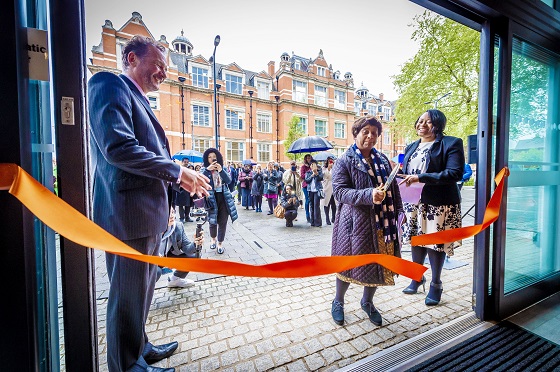
Baroness Lawrence cuts the ribbon at the Stephen Lawrence Research Centre
The celebratory feel to the day began with a ribbon cutting ceremony by Stephen Lawrence’s mother, and Chancellor of DMU, Baroness Doreen Lawrence at the research centre based in the university’s Hugh Aston Building.
It then ended with a four minute standing ovation for the Baroness after a debate that illustrated to the capacity audience of 200 how much talking still needs to be done 26 years after her son was the victim of a racist murder.
RELATED NEWS
Baroness Lawrence urges children to 'live your best life' in memory of her son
Sunday Times names DMU University of the Year for Social Inclusion
Students work with Stephen Lawrence's brother to design great artwork
A panel made up of The Rt Hon Jack Straw - who as Home Secretary in 1997 commissioned the Macpherson Inquiry into the failures of the police investigating Stephen’s murder - revolutionary poet Benjamin Zephaniah and broadcaster Afua Hirsch, addressed where we are 20 years on from the publication of the Macpherson Report.
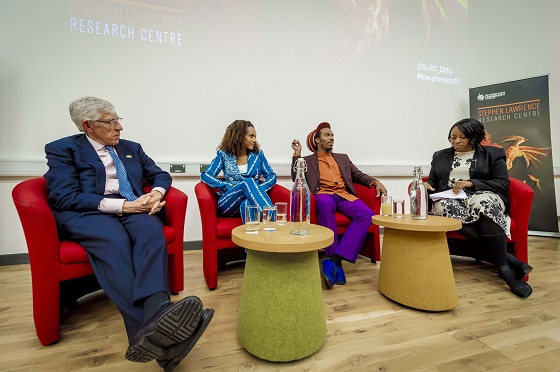
The panel of Jack Straw, Afua Hirsch and Benjamin Zephaniah with Dr Hammond Perry
The debate covered everything from how BAME (Black and Asian Ethnic Minorities) was a convenient and dismissive way of placing hugely diverse cultures under one banner, first hand reports from the audience of racism within institutions across Britain, the sacking of Danny Baker by BBC Radio5 live and the legacy of Stephen Lawrence.
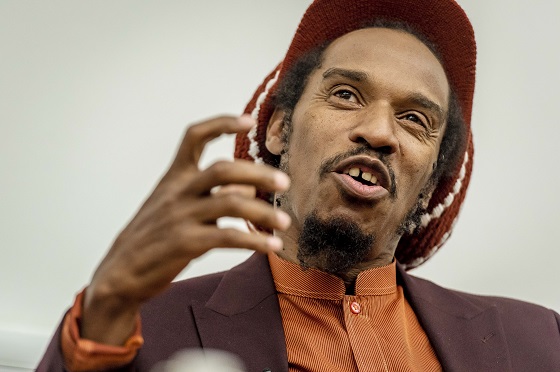
Benjamin Zephaniah
Benjamin said: “What happened when Stephen died was very unique. In one sense we knew this type of thing was happening but the unique thing was Doreen and (her then husband) Neville Lawrence and their dignity and their tenacity.
“We need to keep the memory of Stephen alive because of what he represents, not just for academia but for grass roots children and young people growing up, so they understand the history of black people. Because if we do not tell it and do not write it someone else will and it won’t be the truth.”
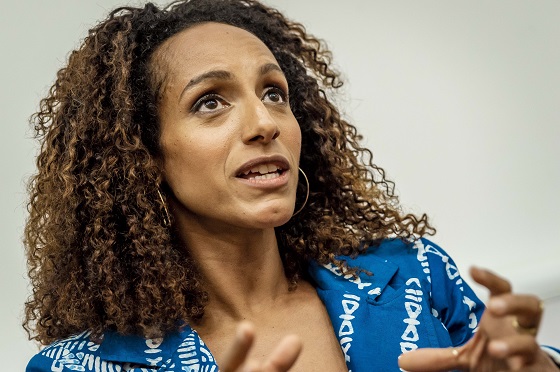
Afua Hirsch
Afua added: “Everything that happened after Stephen Lawrence’s death reached a new level. The Macpherson report gave me a space to speak about institutional racism. Until then it was only something radical people would talk about. It opened up a whole new language.”
All three panellists were in no doubt that institutional racism continued to exist, not just in the police service but across organisations, and it needed to be addressed.
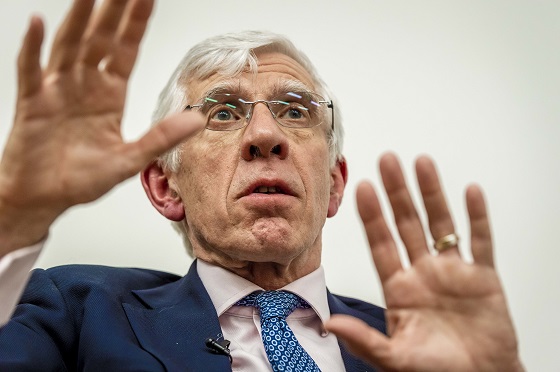
The Rt Hon Jack Straw
The Rt Hon Jack Straw said: “When the Macpherson Report was published 20 years ago there were shockwaves through the police service and many other public and private services that a very senior judge concluded that a service like the Met Police, that had many merits, could be institutionally racist. It was really the first time this concept had been properly identified and authoritatively used. So it opened people’s eyes. There has certainly been the most extraordinary sea change in the Met and most other police forces.
“There is still further progress to go. There are disproportionate numbers of black and Asian men in prison, tied up with low attainment and achievement in schools and disproportionate levels of income too. But things are changing. There are problems with racists on the far right who are being given an easier platform through the ubiquity of social media. In short, a lot done, but lots to do.”
Benjamin said: “Institutional racism is still here. Anybody who says it has gone is wrong. You can have policies and you can have laws but why is there such a rise in right wing racism in the country now? It is because people at a grass roots level look at people at a higher level and see that they are racist, and they have been given permission.
“We have come a long way and we have to acknowledge that. But we still have racists on the streets. They probably won’t come up to you dressed as skinhead thugs. They will probably be wearing a suit and tie. And some of them are in institutions. It may seem a contradiction but some racists are very sophisticated in the way they manifest their racism. That is what we have to deal with.”
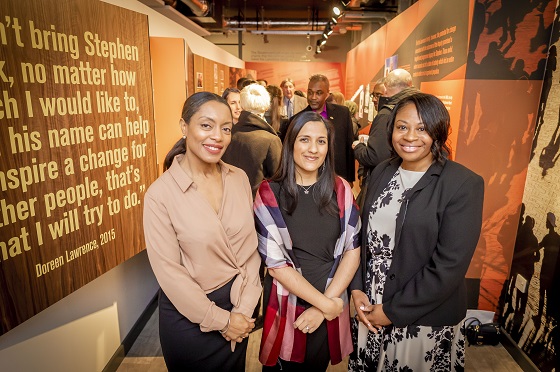
The research centre team Sherilyn Pereira, Monica Barrett and Dr Hammond Perry
Following the debate Dr Hammond Perry said: “I think the centre offers the opportunity to question the term itself (institutional racism) and to think differently about where it applies.
“The Macpherson Report drew our attention to areas around policing but that is a narrow way of thinking about how that term works. There is a lot more to know about the different ways institutional racism impacts different communities. We want to unravel the complexities and how it plays out in different arenas, whether its education, healthcare…there is a broad conversation to be had.
“One of the things I am most proud of today is our audience and the conversation we started about the concept of institutional racism. It’s something the centre will drive forward in its research agendas.”
Sonia Watson, Chief Executive of the Stephen Lawrence Charitable Trust, was part of a large contingent of people who made the trip from London to see the centre opened.
She praised the event and summed up the feelings of many at the opening saying: “This evening has been about starting a vital national conversation, a conversation started here in Leicester, home of the Stephen Lawrence Research Centre, where we are thinking about what change is possible in Britain and where we can research the place that Stephen Lawrence and black history has in shaping the narrative.”
You can watch the full debate on Facebook Live and join in the conversation by clicking here
Posted on Friday 10 May 2019